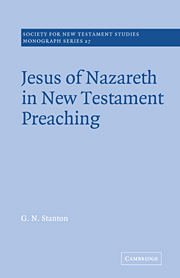Book contents
- Frontmatter
- Contents
- Preface
- Abbreviations
- Introduction
- 1 Jesus of Nazareth in missionary preaching: Luke's view
- 2 Luke's presentation of Jesus in his Gospel
- 3 Pre-Lucan traditions about Jesus in the speeches in Acts
- 4 Jesus in Paul's preaching
- 5 The gospels and ancient biographical writing
- 6 Jesus in the gospel traditions
- 7 The gospel traditions in the early church
- Conclusions
- Index of passages cited
- Index of authors
- General Index
3 - Pre-Lucan traditions about Jesus in the speeches in Acts
Published online by Cambridge University Press: 04 October 2009
- Frontmatter
- Contents
- Preface
- Abbreviations
- Introduction
- 1 Jesus of Nazareth in missionary preaching: Luke's view
- 2 Luke's presentation of Jesus in his Gospel
- 3 Pre-Lucan traditions about Jesus in the speeches in Acts
- 4 Jesus in Paul's preaching
- 5 The gospels and ancient biographical writing
- 6 Jesus in the gospel traditions
- 7 The gospel traditions in the early church
- Conclusions
- Index of passages cited
- Index of authors
- General Index
Summary
Luke envisages that outside Jerusalem, where knowledge of Jesus could not simply be assumed, a sketch of the life and character of Jesus was an integral part of missionary preaching. Is Luke, far from reproducing examples of primitive preaching, showing his readers that this is how the gospel is preached and ought to be preached in his own day? C. H. Dodd's view that the speeches in Acts could be taken with some confidence to represent, ‘not indeed what Peter said upon this or that occasion, but the kerygma of the early church at Jerusalem at an early period’, has been vigorously challenged. In this chapter the origin of the speeches in Acts 1–13 is reconsidered; particular attention is given to Peter's speech to Cornelius at Caesarea (Acts 10: 34–43). This speech contains the only extended summary of the ministry of Jesus; but a lengthy account of the life and character of Jesus is unnecessary: Luke has set out the story of Jesus in full in his Gospel and there is thus no need for extensive repetition.
There are a number of Lucan expressions in this speech; Luke's stylistic and theological imprint can be traced with some confidence. But this need not necessarily lead to the conclusion that Luke has composed this speech himself and that its references to the ministry are a summary of his own Gospel. For we know from his Gospel that Luke places his own stamp upon the earlier traditions he uses.
- Type
- Chapter
- Information
- Jesus of Nazareth in New Testament Preaching , pp. 67 - 85Publisher: Cambridge University PressPrint publication year: 1975



